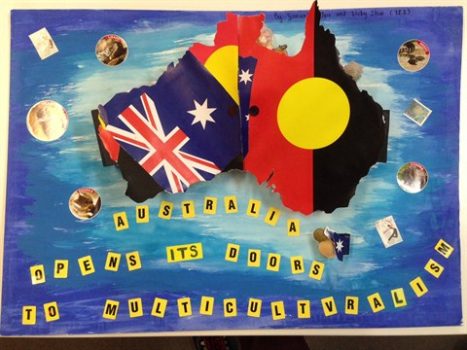Diversifying ‘Diversity’

By Robert Wood
‘Diversity’ has been a hot topic in public discourse recently in the United States, United Kingdom and Australia as well as other Anglophone nations. In Australia, this has been present in recent writing in The Saturday Paper by Omar Sakr and there has been a nuanced debate happening about Chinese Australian identity involving Tseen Khoo in Eureka Street in response to Cecily Huang on the ABC. These are nationally visible.
As I wrote in response to Andy Butler for Overland last year, diversity is seen as a demographic good with instrumental value, rather than a principle that has merit in and of itself. In that way, diversity reads simply and this includes many commentaries on it. It is where the assuredly fixed identity of an author is used to read their work, to place them on activist conversation pieces, on literary and cultural festival panels, to have them act as a representative for their raced, gendered, sexed people in such a way that they are reduced to experiences grounded in their body. And diverse writers are complicit in this, or, as I prefer to see it, biding their time and gathering power, capital, position in which to create a structural change that would have us be more than the sum of our parts.
And yet, there is a bad taste that lingers in my mouth. It is that we cannot seem to escape the diversity paradox, which is to say, in aiming to be representative, in speaking for the silenced, we represent ourselves to the master’s liking. Why else would there be a willing audience? In that way, the challenge is not only about getting into positions that matter, in authoring books or, even better, in becoming activists, editors, critics, publishers and other people in the field. It is also about altering what happens once we get there, and in the process of doing so helping that conversation inch a little further towards a better future that we can currently imagine.
In that way, diversity must be a principle and not simply a technique of demography, not only a way to tick boxes, but also a way to change art and the politics as well. That cannot only be through diverse content, where we mimic the narrative we are so used to from Plato to Jonathon Franzen or even fellow traveller like Marx. Diversity in form matters too, which means we need literature that does not only tell us about the experience of queer or brown or working people, but that we must find new forms that line up with those. This is not to say that the manifesto, the novel, the sonnet is, inter alia, a conservative form but that we might populate our world with diverse ways of resisting and writing not only in how we behave and what we write.
That means a diversity of style, voice, tone, form as well as substance. This engages will age old concerns of the imagination, the expert, the possible. And so, it does not immediately follow that because someone is from a diverse category that they should become the voice of those people as a people. What it means is that we should encourage a platform where we can speak about this in such a way that many voices are heard, even, and maybe especially the bad ones. Without the right to fight against, the coalition fragments itself into ever smaller parts until no one is left but you alone. And that is the trap of liberalism no matter how much hope it holds out for us – that we are so confident in the self that the individual thinks they can solve the ills of the world alone. That is not good for anyone, least of all the marginalised.
When we think of diversity it is not only that we need to have Othered people speaking with us, but that we need to keep our eyes on the opposition that would get rid of us. That means being aware of marginalised people in the process of getting where you are. That means that we can find something redemptive in ‘the white issue’ as Sakr termed it rather than setting out to repeat the raced categories we have been brought up into. This means a year zero that grows out of solidarity rather than finding an easy opposition to what apparently Others us because in that situation we have only tinkered at the edges of what is possible. The challenge is not then to fight against white bourgeois feminists or the straw men who are in positions of power or even the historical heavyweights from another era. It is to create coalitions of the willing across lines that do not in fact divide us, or maybe even matter, so we can actually talk about our craft and not only the experiences that have shaped us.
References:
Omar J. Sakr, Representation and diversity, The Saturday Paper
Andrew Hamilton, Don’t let the Apology’s great hope die, Eureka Street
Tseen Khoo, There’s no wrong way to be Chinese overseas, Eureka Street
Cecily Huang, Chinese New Year is more complex than some Australians think, ABC
Robert Wood, After liberalism: a response to ‘Safe White Spaces’, Overland
 Robert Wood’s writing has been published in numerous literary and academic journals. He has interned for Overland, edited for Peril and Cordite, been a columnist for Cultural Weekly. At present he works for The Centre for Stories.
Robert Wood’s writing has been published in numerous literary and academic journals. He has interned for Overland, edited for Peril and Cordite, been a columnist for Cultural Weekly. At present he works for The Centre for Stories.









5 comments
Login here Register here-
Jamboree
-
Nero Dog
-
king1394
-
paul walter
-
wam
Return to home pageNot entirely sure of the take home message here Robert. Perhaps you argue that we should not be reductionist, ie invent a single, overarching ‘me’? De Beauvoir started her famous book on ‘the second sex’ with the statement that a woman is made, not born. It is a denial of one’s freedom she argues to define who the me is and act according to that imagined identity. Instead, philosophers argue since, I belong to many different epistemic communities, am never any one thing. The French dislike ‘multikulti’ (the German neat phrase) because it is socially atomistic. For them, referendums concerning a people within the nation have to be nation-state wide, not just in Algeria or New Caledonia. In sum, the Brits accept that Gibraltar votes to stay British and a sui generis EU territory; in contrast France’s decision to restrict the referendum on its future status to New Caledonia’s population alone was condemned by several French jurists, since in French law a ‘people’ refers to the State in general and is never an ethnic or anthropological word.
I would like Robert to clarify. Is he saying that epistemic communities are more productive than biological ones? Still, that is simply replacing one fossilized identity for another. I am not black, I am instead anti apartheid. Which certainly avoids ethnic or gendered reductionism. But it makes me one dimensional still. To be human is to be a chamelion; I change my colour at will. Perhaps the post modern language the author uses has hindered my comprehension.
There is a lot of remarkable biodiversity in Australia which is being crushed by overpopulation and development. Human cultural diversity next to the diversity of our ecological communities is so superficial.
When one story remains the focus for weeks as analysts examine the actions of a few people, who seem to be very much white men, and who play one particularly narrow sport at an elite level so that almost no other news gets through, you know it will take a while before a balanced diversity of information can be accessed in the mainstream media in Australia.
Diversity is the great enemy of the authoritarian- far easier to line up a single target, hence enforcement of style and content specifications.
A hard read, Robert,
Today’s classroom will show the diversity missing from the staff room, the diversity of which in turn is missing from the administration?
I still get a laugh for suggesting that diversity is missing till an Aboriginal actor plays a non-Aborigine on TV. Deborah came close in oddball
But that is to be expected when the children of the immigrants who kept pig-iron bob in power seem to think multiculturalism is integration with garlic making diversity a politically correct wank.